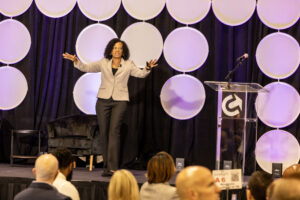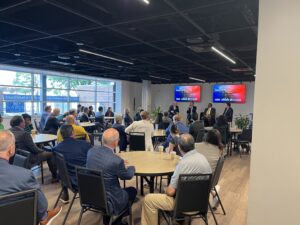Chattanooga’s smart grid, powered by EPB, was recently recognized by Green Business Certification Inc. (GBCI) for achieving Performance Excellence in Electric Renewal (PEER) Gold recertification.
“Through their Gold recertification, Chattanooga has achieved the most resilient and reliable PEER-certified utility power grid in the United States,” says Sean McMahon, vice president of product management, GBCI.
Established in 2008, GBCI is a leading, third-party certification and credentialing body for built environments. This recognition builds on EPB’s designation as the first municipality to achieve PEER certification, a milestone reached in 2015. Since then, EPB has continued to improve its grid performance and deliver reliable power to customers throughout the region.
The PEER Gold designation recognizes EPB for integrating sustainability into its electrical distribution system. Companies within EPB’s service network can now earn points toward Leadership in Energy and Environmental Design (LEED) certification of their green development projects, through the U.S. Green Building Council.
As part of its commitment to sustainability, Volkswagen Group of America is integrating EPB’s smart grid designation into its plan of building a new Battery Engineering Lab in Chattanooga to LEED’s green building standards. The upcoming battery lab will help drive more tech, engineering and production jobs to Chattanooga while shaping the automaker’s electric future in North America.
Trend had the opportunity to sit down with Elizabeth Hammitt, director of residential energy and environmental solutions, EPB, to learn more about what this designation means for Chattanooga.
Trend: How does it feel to have achieved PEER Gold recertification?
Hammitt: PEER has been a wonderful exercise for our operations group… allowing us to go through a third-party process and see how our grid measures up. PEER has rigorous standards for what makes a sustainable electric grid. Earning Gold recertification is really gratifying, but it also shows us that the sky is the limit. We can continually improve while still being excited about our success.
Trend: How does a company qualify for PEER Gold certification? Why was EPB selected?
Hammitt: EPB self-selected to go through the PEER certification process. The certification was carried out by our Distribution Standards and Design team, led by manager David Nordy with input from many areas of the company. PEER looks at several categories of what makes a resilient grid, as well as excellence in operating an electric grid. This includes everything from a grid’s efficiency to how responsive and resilient it is in the face of our changing climate. It also looks at a company’s community outreach, like what kinds of programs are offered so customers can manage their energy dollars and what community benefit programs are offered. It’s a very comprehensive certification process.
Trend: How does EPB’s PEER Gold certification benefit companies like Volkswagen? How did this collaboration begin?
Hammitt: We at EPB knew that Volkswagen was working on their battery lab and reached out to share this great resource. There are synergies between the PEER certification program and LEED for new construction. We were able to collaborate on points that Volkswagen can use as a result of our certification. LEED certification projects or new construction projects in our service territory are able to earn one point just by being connected to our grid. Up to 20 points could be achieved, based on programs confirmed by our PEER designation.
Trend: How can other companies integrate this designation into their green development projects?
Hammitt: Companies can go to our website and place an inquiry as a commercial customer, or call us directly and ask to speak with our key customer group.
Trend: How does this designation impact our community? Does it help validate that EPB is on the right track toward reaching its reliability and sustainability goals?
Hammitt: PEER is a useful tool for taking stock of our company’s operations, and how those operations compare to best practices. Even more so, PEER means two things for our community and those looking to start a new business in Chattanooga. First, this certification states that we have the most resilient, PEER-certified grid in America. We’ve heard a lot about power outages throughout the country — but when it comes to power reliability, Chattanooga is ahead of the game. If you live in EPB’s service territory, know that you’re connected to one of the most reliable power sources, even in the face of extreme weather. Second, this third-party recognition gives us permission to dream big when it comes to sustainability. Our infrastructure allows flexibility for the mass adoption of electric vehicles, electricity storage, distributed solar — like solar on your home or business, or utility-scale solar, meaning large-scale generation. The sky is the limit when it comes to reducing carbon impact through electric emissions in Chattanooga. We at EPB want to support our customers as they explore sustainability goals. As a public utility here to increase the quality of life, this is an important part of our business.
Recently, a study revealed that the broadband network built by EPB has generated nearly $2.7 billion in economic benefits since being built over a decade ago. The 100% fiber-optic backbone of this smart grid allows for nearly limitless possibilities when it comes to sustainability while ensuring fast and reliable power for all Chattanooga residents.
Learn more about EPB’s PEER Gold certification, here.
Images courtesy of EPB/Volkswagen. At the top, Wolfgang Maluche, vice president at Volkswagen’s Engineering and Planning Center (EPC) in Chattanooga. In the Q&A, Elizabeth Hammitt, director of residential energy and environmental solutions at EPB.






